- Home
- Jack London
John Barleycorn Page 2
John Barleycorn Read online
Page 2
The Italian rancho was a bachelor establishment. Our visit was hailed with delight. The red wine was poured in tumblers for all, and the long dining-room was partly cleared for dancing. And the young fellows drank and danced with the girls to the strains of an accordion. To me that music was divine. I had never heard anything so glorious. The young Italian who furnished it would even get up and dance, his arms around his girl, playing the accordion behind her back. All of which was very wonderful for me, who did not dance, but who sat at a table and gazed wide-eyed at the amazingness of life. I was only a little lad, and there was so much of life for me to learn. As the time passed, the Irish lads began helping themselves to the wine, and jollity and high spirits reigned. I noted that some of them staggered and fell down in the dances, and that one had gone to sleep in a corner. Also, some of the girls were complaining, and wanting to leave, and others of the girls were titteringly complacent, willing for anything to happen.
When our Italian hosts had offered me wine in a general sort of way, I had declined. My beer experience had been enough for me, and I had no inclination to traffic further in the stuff, or in anything related to it. Unfortunately, one young Italian, Peter, an impish soul, seeing me sitting solitary, stirred by a whim of the moment, half-filled a tumbler with wine and passed it to me. He was sitting across the table from me. I declined. His face grew stern, and he insistently proffered the wine. And then terror descended upon mea terror which I must explain.
My mother had theories. First, she steadfastly maintained that brunettes and all the tribe of dark-eyed humans were deceitful. Needless to say, my mother was a blonde. Next, she was convinced that the dark-eyed Latin races were profoundly sensitive, profoundly treacherous, and profoundly murderous. Again and again, drinking in the strangeness and the fearsomeness of the world from her lips, I had heard her state that if one offended an Italian, no matter how slightly and unintentionally, he was certain to retaliate by stabbing one in the back. That was her particular phrase”stab you in the back.”
Now, although I had been eager to see Black Matt kill Tom Morrisey that morning, I did not care to furnish to the dancers the spectacle of a knife sticking in my back. I had not yet learned to distinguish between facts and theories. My faith was implicit in my mother’s exposition of the Italian character. Besides, I had some glimmering inkling of the sacredness of hospitality. Here was a treacherous, sensitive, murderous Italian, offering me hospitality. I had been taught to believe that if I offended him he would strike at me with a knife precisely as a horse kicked out when one got too close to its heels and worried it. Then, too, this Italian, Peter, had those terrible black eyes I had heard my mother talk about. They were eyes different from the eyes I knew, from the blues and greys and hazels of my own family, from the pale and genial blues of the Irish. Perhaps Peter had had a few drinks. At any rate, his eyes were brilliantly black and sparkling with devilry. They were the mysterious, the unknown, and who was I, a seven-year-old, to analyse them and know their prankishness? In them I visioned sudden death, and I declined the wine half-heartedly. The expression in his eyes changed. They grew stern and imperious as he shoved the tumbler of wine closer.
What could I do? I have faced real death since in my life, but never have I known the fear of death as I knew it then. I put the glass to my lips, and Peter’s eyes relented. I knew he would not kill me just then. That was a relief. But the wine was not. It was cheap, new wine, bitter and sour, made of the leavings and scrapings of the vineyards and the vats, and it tasted far worse than beer. There is only one way to take medicine, and that is to take it. And that is the way I took that wine. I threw my head back and gulped it down. I had to gulp again and hold the poison down, for poison it was to my child’s tissues and membranes.
Looking back now, I can realise that Peter was astounded. He half-filled a second tumbler and shoved it across the table. Frozen with fear, in despair at the fate which had befallen me, I gulped the second glass down like the first. This was too much for Peter. He must share the infant prodigy he had discovered. He called Dominick, a young moustached Italian, to see the sight. This time it was a full tumbler that was given me. One will do anything to live. I gripped myself, mastered the qualms that rose in my throat, and downed the stuff.
Dominick had never seen an infant of such heroic calibre. Twice again he refilled the tumbler, each time to the brim, and watched it disappear down my throat. By this time my exploits were attracting attention. Middle-aged Italian labourers, old-country peasants who did not talk English, and who could not dance with the Irish girls, surrounded me. They were swarthy and wild-looking; they wore belts and red shirts; and I knew they carried knives; and they ringed me around like a pirate chorus. And Peter and Dominick made me show off for them.
Had I lacked imagination, had I been stupid, had I been stubbornly mulish in having my own way, I should never have got in this pickle. And the lads and lassies were dancing, and there was no one to save me from my fate. How much I drank I do not know. My memory of it is of an age-long suffering of fear in the midst of a murderous crew, and of an infinite number of glasses of red wine passing across the bare boards of a wine-drenched table and going down my burning throat. Bad as the wine was, a knife in the back was worse, and I must survive at any cost.
Looking back with the drinker’s knowledge, I know now why I did not collapse stupefied upon the table. As I have said, I was frozen, I was paralysed, with fear. The only movement I made was to convey that never-ending procession of glasses to my lips. I was a poised and motionless receptacle for all that quantity of wine. It lay inert in my fear-inert stomach. I was too frightened, even, for my stomach to turn. So all that Italian crew looked on and marvelled at the infant phenomenon that downed wine with the sang-froid of an automaton. It is not in the spirit of braggadocio that I dare to assert they had never seen anything like it.
The time came to go. The tipsy antics of the lads had led a majority of the soberer-minded lassies to compel a departure. I found myself, at the door, beside my little maiden. She had not had my experience, so she was sober. She was fascinated by the titubations of the lads who strove to walk beside their girls, and began to mimic them. I thought this a great game, and I, too, began to stagger tipsily. But she had no wine to stir up, while my movements quickly set the fumes rising to my head. Even at the start, I was more realistic than she. In several minutes I was astonishing myself. I saw one lad, after reeling half a dozen steps, pause at the side of the road, gravely peer into the ditch, and gravely, and after apparent deep thought, fall into it. To me this was excruciatingly funny. I staggered to the edge of the ditch, fully intending to stop on the edge. I came to myself, in the ditch, in process of being hauled out by several anxious-faced girls.
I didn’t care to play at being drunk any more. There was no more fun in me. My eyes were beginning to swim, and with wide-open mouth I panted for air. A girl led me by the hand on either side, but my legs were leaden. The alcohol I had drunk was striking my heart and brain like a club. Had I been a weakling of a child, I am confident that it would have killed me. As it was, I know I was nearer death than any of the scared girls dreamed. I could hear them bickering among themselves as to whose fault it was; some were weepingfor themselves, for me, and for the disgraceful way their lads had behaved. But I was not interested. I was suffocating, and I wanted air. To move was agony. It made me pant harder. Yet those girls persisted in making me walk, and it was four miles home. Four miles! I remember my swimming eyes saw a small bridge across the road an infinite distance away. In fact, it was not a hundred feet distant. When I reached it, I sank down and lay on my back panting. The girls tried to lift me, but I was helpless and suffocating. Their cries of alarm brought Larry, a drunken youth of seventeen, who proceeded to resuscitate me by jumping on my chest. Dimly I remember this, and the squalling of the girls as they struggled with him and dragged him away. And then I knew nothing, though I learned afterward that Larry wound up under the bridge and spent the ni
ght there.
When I came to, it was dark. I had been carried unconscious for four miles and been put to bed. I was a sick child, and, despite the terrible strain on my heart and tissues, I continually relapsed into the madness of delirium. All the contents of the terrible and horrible in my child’s mind spilled out. The most frightful visions were realities to me. I saw murders committed, and I was pursued by murderers. I screamed and raved and fought. My sufferings were prodigious. Emerging from such delirium, I would hear my mother’s voice: “But the child’s brain. He will lose his reason.” And sinking back into delirium, I would take the idea with me and be immured in madhouses, and be beaten by keepers, and surrounded by screeching lunatics.
One thing that had strongly impressed my young mind was the talk of my elders about the dens of iniquity in San Francisco ‘s Chinatown . In my delirium I wandered deep beneath the ground through a thousand of these dens, and behind locked doors of iron I suffered and died a thousand deaths. And when I would come upon my father, seated at table in these subterranean crypts, gambling with Chinese for great stakes of gold, all my outrage gave vent in the vilest cursing. I would rise in bed, struggling against the detaining hands, and curse my father till the rafters rang. All the inconceivable filth a child running at large in a primitive countryside may hear men utter was mine; and though I had never dared utter such oaths, they now poured from me, at the top of my lungs, as I cursed my father sitting there underground and gambling with long-haired, long-nailed Chinamen.
It is a wonder that I did not burst my heart or brain that night. A seven-year-old child’s arteries and nerve-centres are scarcely fitted to endure the terrific paroxysms that convulsed me. No one slept in the thin, frame farm-house that night when John Barleycorn had his will of me. And Larry, under the bridge, had no delirium like mine. I am confident that his sleep was stupefied and dreamless, and that he awoke next day merely to heaviness and moroseness, and that if he lives to-day he does not remember that night, so passing was it as an incident. But my brain was seared for ever by that experience. Writing now, thirty years afterward, every vision is as distinct, as sharp-cut, every pain as vital and terrible, as on that night.
I was sick for days afterward, and I needed none of my mother’s injunctions to avoid John Barleycorn in the future. My mother had been dreadfully shocked. She held that I had done wrong, very wrong, and that I had gone contrary to all her teaching. And how was I, who was never allowed to talk back, who lacked the very words with which to express my psychologyhow was I to tell my mother that it was her teaching that was directly responsible for my drunkenness? Had it not been for her theories about dark eyes and Italian character, I should never have wet my lips with the sour, bitter wine. And not until man-grown did I tell her the true inwardness of that disgraceful affair.
In those after days of sickness, I was confused on some points, and very clear on others. I felt guilty of sin, yet smarted with a sense of injustice. It had not been my fault, yet I had done wrong. But very clear was my resolution never to touch liquor again. No mad dog was ever more afraid of water than was I of alcohol.
Yet the point I am making is that this experience, terrible as it was, could not in the end deter me from forming John Barleycorn’s cheek-by-jowl acquaintance. All about me, even then, were the forces moving me toward him. In the first place, barring my mother, ever extreme in her views, it seemed to me all the grown-ups looked upon the affair with tolerant eyes. It was a joke, something funny that had happened. There was no shame attached. Even the lads and lassies giggled and snickered over their part in the affair, narrating with gusto how Larry had jumped on my chest and slept under the bridge, how So-and-So had slept out in the sandhills that night, and what had happened to the other lad who fell in the ditch. As I say, so far as I could see, there was no shame anywhere. It had been something ticklishly, devilishly finea bright and gorgeous episode in the monotony of life and labour on that bleak, fog-girt coast.
The Irish ranchers twitted me good-naturedly on my exploit, and patted me on the back until I felt that I had done something heroic. Peter and Dominick and the other Italians were proud of my drinking prowess. The face of morality was not set against drinking. Besides, everybody drank. There was not a teetotaler in the community. Even the teacher of our little country school, a greying man of fifty, gave us vacations on the occasions when he wrestled with John Barleycorn and was thrown. Thus there was no spiritual deterrence. My loathing for alcohol was purely physiological. I didn’t like the damned stuff.
CHAPTER V
This physical loathing for alcohol I have never got over. But I have conquered it. To this day I conquer it every time I take a drink. The palate never ceases to rebel, and the palate can be trusted to know what is good for the body. But men do not drink for the effect alcohol produces on the body. What they drink for is the brain-effect; and if it must come through the body, so much the worse for the body.
And yet, despite my physical loathing for alcohol, the brightest spots in my child life were the saloons. Sitting on the heavy potato wagons, wrapped in fog, feet stinging from inactivity, the horses plodding slowly along the deep road through the sandhills, one bright vision made the way never too long. The bright vision was the saloon at Colma, where my father, or whoever drove, always got out to get a drink. And I got out to warm by the great stove and get a soda cracker. Just one soda cracker, but a fabulous luxury. Saloons were good for something. Back behind the plodding horses, I would take an hour in consuming that one cracker. I took the smallest nibbles, never losing a crumb, and chewed the nibble till it became the thinnest and most delectable of pastes. I never voluntarily swallowed this paste. I just tasted it, and went on tasting it, turning it over with my tongue, spreading it on the inside of this cheek, then on the inside of the other cheek, until, at the end, it eluded me and in tiny drops and oozelets, slipped and dribbled down my throat. Horace Fletcher had nothing on me when it came to soda crackers.
I liked saloons. Especially I liked the San Francisco saloons. They had the most delicious dainties for the takingstrange breads and crackers, cheeses, sausages, sardineswonderful foods that I never saw on our meagre home-table. And once, I remember, a barkeeper mixed me a sweet temperance drink of syrup and soda-water. My father did not pay for it. It was the barkeeper’s treat, and he became my ideal of a good, kind man. I dreamed day-dreams of him for years. Although I was seven years old at the time, I can see him now with undiminished clearness, though I never laid eyes on him but that one time. The saloon was south of Market Street in San Francisco . It stood on the west side of the street. As you entered, the bar was on the left. On the right, against the wall, was the free lunch counter. It was a long, narrow room, and at the rear, beyond the beer kegs on tap, were small, round tables and chairs. The barkeeper was blue-eyed, and had fair, silky hair peeping out from under a black silk skull-cap. I remember he wore a brown Cardigan jacket, and I know precisely the spot, in the midst of the array of bottles, from which he took the bottle of red-coloured syrup. He and my father talked long, and I sipped my sweet drink and worshipped him. And for years afterward I worshipped the memory of him.
Despite my two disastrous experiences, here was John Barleycorn, prevalent and accessible everywhere in the community, luring and drawing me. Here were connotations of the saloon making deep indentations in a child’s mind. Here was a child, forming its first judgments of the world, finding the saloon a delightful and desirable place. Stores, nor public buildings, nor all the dwellings of men ever opened their doors to me and let me warm by their fires or permitted me to eat the food of the gods from narrow shelves against the wall. Their doors were ever closed to me; the saloon’s doors were ever open. And always and everywhere I found saloons, on highway and byway, up narrow alleys and on busy thoroughfares, bright-lighted and cheerful, warm in winter, and in summer dark and cool. Yes, the saloon was a mighty fine place, and it was more than that.
By the time I was ten years old, my family had abandoned
ranching and gone to live in the city. And here, at ten, I began on the streets as a newsboy. One of the reasons for this was that we needed the money. Another reason was that I needed the exercise. I had found my way to the free public library, and was reading myself into nervous prostration. On the poor ranches on which I had lived there had been no books. In ways truly miraculous, I had been lent four books, marvellous books, and them I had devoured. One was the life of Garfield ; the second, Paul du Chaillu’s African travels; the third, a novel by Ouida with the last forty pages missing; and the fourth, Irving ‘s ” Alhambra .” This last had been lent me by a school-teacher. I was not a forward child. Unlike Oliver Twist, I was incapable of asking for more. When I returned the ” Alhambra ” to the teacher I hoped she would lend me another book. And because she did notmost likely she deemed me unappreciativeI cried all the way home on the three-mile tramp from the school to the ranch. I waited and yearned for her to lend me another book. Scores of times I nerved myself almost to the point of asking her, but never quite reached the necessary pitch of effrontery.

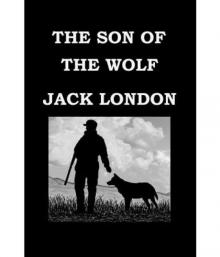 The Son of the Wolf
The Son of the Wolf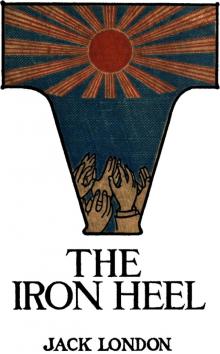 The Iron Heel
The Iron Heel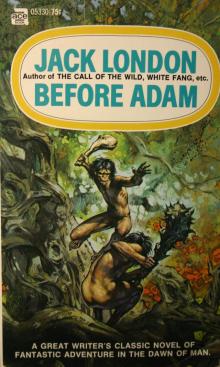 Before Adam
Before Adam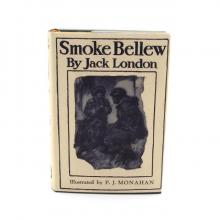 Smoke Bellew
Smoke Bellew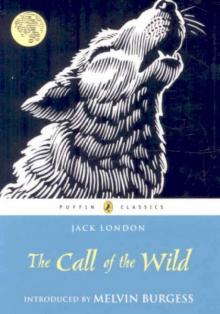 The Call of the Wild
The Call of the Wild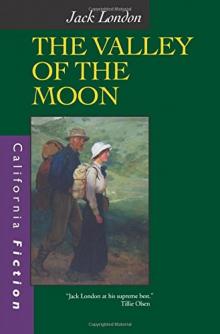 The Valley of the Moon Jack London
The Valley of the Moon Jack London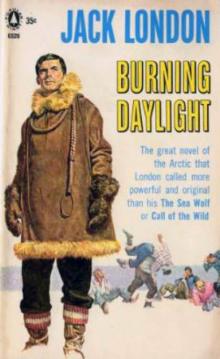 Burning Daylight
Burning Daylight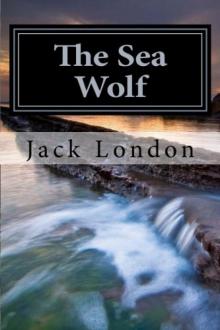 The Sea Wolf
The Sea Wolf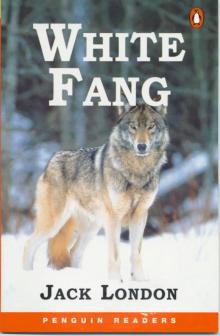 White Fang
White Fang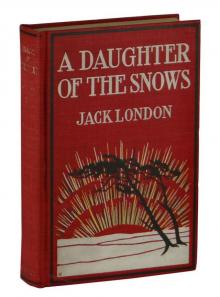 A Daughter of the Snows
A Daughter of the Snows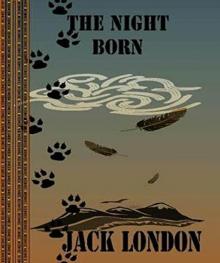 The Night-Born
The Night-Born A Son Of The Sun
A Son Of The Sun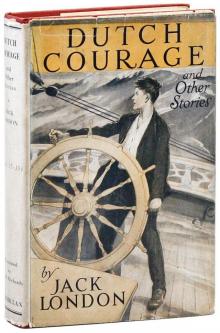 Dutch Courage and Other Stories
Dutch Courage and Other Stories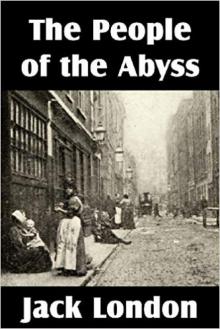 The People of the Abyss
The People of the Abyss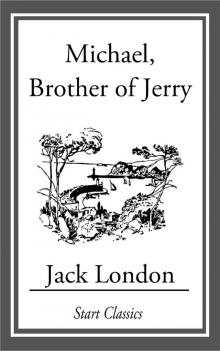 Michael, Brother of Jerry
Michael, Brother of Jerry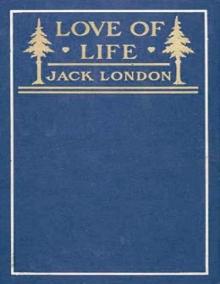 Love of Life, and Other Stories
Love of Life, and Other Stories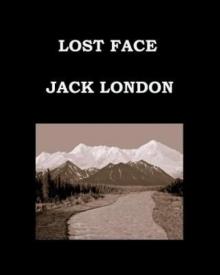 Lost Face
Lost Face The Road
The Road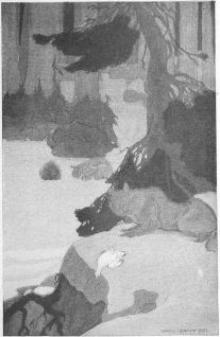 Love of Life
Love of Life The Turtles of Tasman
The Turtles of Tasman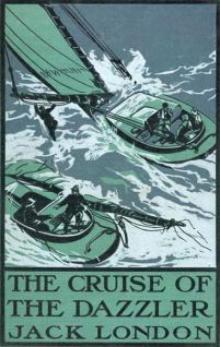 The Cruise of The Dazzler
The Cruise of The Dazzler The Heathen
The Heathen The Scab
The Scab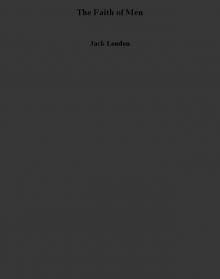 The Faith of Men
The Faith of Men Adventure
Adventure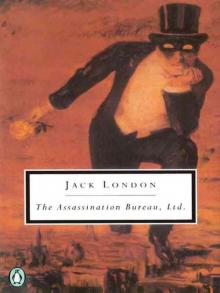 The Assassination Bureau, Ltd.
The Assassination Bureau, Ltd.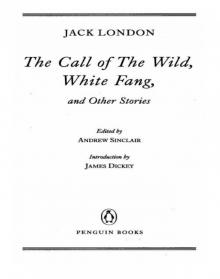 The Call of the Wild, White Fang, and Other Stories
The Call of the Wild, White Fang, and Other Stories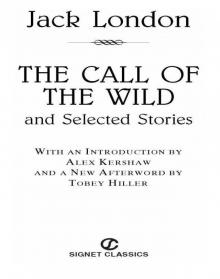 The Call of the Wild and Selected Stories
The Call of the Wild and Selected Stories Jerry of the Islands
Jerry of the Islands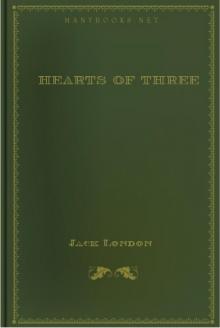 Hearts of Three
Hearts of Three The House of Pride
The House of Pride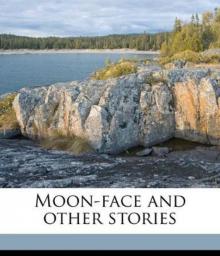 Moon-Face and Other Stories
Moon-Face and Other Stories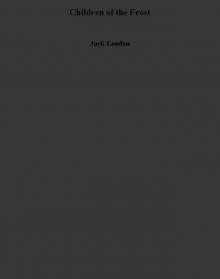 Children of the Frost
Children of the Frost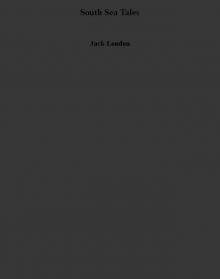 South Sea Tales
South Sea Tales The Strength of the Strong
The Strength of the Strong The Jacket (The Star-Rover)
The Jacket (The Star-Rover) The Little Lady of the Big House
The Little Lady of the Big House John Barleycorn
John Barleycorn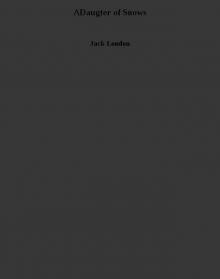 ADaugter of Snows
ADaugter of Snows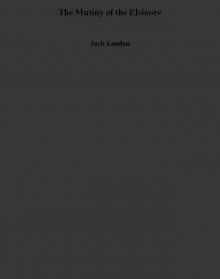 The Mutiny of the Elsinore
The Mutiny of the Elsinore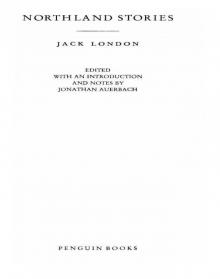 Northland Stories
Northland Stories Tales of the Fish Patrol
Tales of the Fish Patrol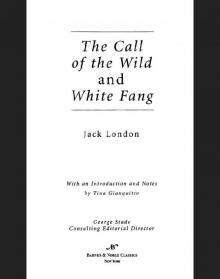 Call of the Wild and White Fang (Barnes & Noble Classics Series)
Call of the Wild and White Fang (Barnes & Noble Classics Series)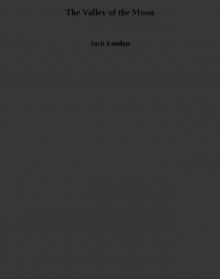 The Valley of the Moon
The Valley of the Moon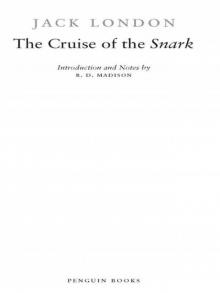 The Cruise of the Snark
The Cruise of the Snark The Game
The Game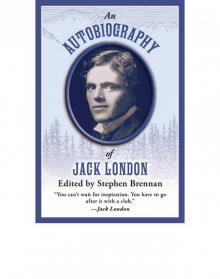 An Autobiography of Jack London
An Autobiography of Jack London